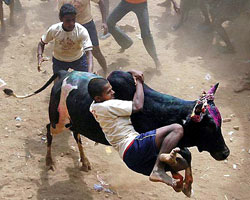Mattu Pongal
Mattu Pongal is a festival celebrated in the Tamil Nadu state of India and by the Tamil community worldwide. It is part of the Pongal festival, which is a multi-day Hindu harvest festival. Mattu Pongal is specifically dedicated to the worship of cattle, acknowledging their significant role in agriculture. It falls on the third day of the Pongal festivities, which are held in January every year, following the Tamil solar calendar.
Etymology[edit | edit source]
The word "Mattu" means bull in Tamil, and "Pongal" is a sweet dish made from newly harvested rice, milk, and jaggery, symbolizing prosperity and abundance. Therefore, Mattu Pongal translates to "Pongal for the bulls."
History and Significance[edit | edit source]
The origins of Mattu Pongal are deeply rooted in the agrarian culture of Tamil Nadu, where cattle are pivotal to the ploughing of fields and the overall agricultural process. This day is a tribute to the hard work of the bulls and cows, thanking them for their contribution to the harvest. The festival underscores the traditional Indian ethos of respecting all life forms, highlighting the symbiotic relationship between humans and animals.
Celebrations[edit | edit source]
On Mattu Pongal, cattle are adorned with beads, bells, and flowers; their horns are painted, and they are fed with Pongal and other delicacies. Special prayers are offered, and in some places, cattle races or Jallikattu, a traditional bull-taming sport, are organized. The event is a vibrant display of culture, with music, dance, and feasting, reflecting the community's joy and gratitude towards nature's bounty.
Jallikattu[edit | edit source]
Jallikattu is an ancient sport associated with Mattu Pongal, where bulls are released into a crowd, and participants attempt to grab the hump on the bull's back with both arms and hang on to it while the bull tries to escape. Jallikattu is celebrated with fervor, particularly in the districts of Madurai, Tiruchirappalli, and Tanjore in Tamil Nadu. It is considered a test of bravery and strength, and it draws participants and spectators from across the region.
Cultural Impact[edit | edit source]
Mattu Pongal plays a crucial role in preserving and promoting Tamil culture and traditions. It is a time for families to come together, celebrate their heritage, and show reverence to nature and the animal kingdom. The festival also attracts tourists, offering them a glimpse into the rich cultural tapestry of Tamil Nadu.
Contemporary Relevance[edit | edit source]
In recent years, Mattu Pongal and Jallikattu have gained attention for animal rights concerns. However, they remain integral to Tamil culture, symbolizing the enduring bond between humans and nature. Efforts are being made to ensure the celebrations are conducted in a manner that is safe and respectful to the animals involved.
Search WikiMD
Ad.Tired of being Overweight? Try W8MD's physician weight loss program.
Semaglutide (Ozempic / Wegovy and Tirzepatide (Mounjaro / Zepbound) available.
Advertise on WikiMD
|
WikiMD's Wellness Encyclopedia |
| Let Food Be Thy Medicine Medicine Thy Food - Hippocrates |
Translate this page: - East Asian
中文,
日本,
한국어,
South Asian
हिन्दी,
தமிழ்,
తెలుగు,
Urdu,
ಕನ್ನಡ,
Southeast Asian
Indonesian,
Vietnamese,
Thai,
မြန်မာဘာသာ,
বাংলা
European
español,
Deutsch,
français,
Greek,
português do Brasil,
polski,
română,
русский,
Nederlands,
norsk,
svenska,
suomi,
Italian
Middle Eastern & African
عربى,
Turkish,
Persian,
Hebrew,
Afrikaans,
isiZulu,
Kiswahili,
Other
Bulgarian,
Hungarian,
Czech,
Swedish,
മലയാളം,
मराठी,
ਪੰਜਾਬੀ,
ગુજરાતી,
Portuguese,
Ukrainian
Medical Disclaimer: WikiMD is not a substitute for professional medical advice. The information on WikiMD is provided as an information resource only, may be incorrect, outdated or misleading, and is not to be used or relied on for any diagnostic or treatment purposes. Please consult your health care provider before making any healthcare decisions or for guidance about a specific medical condition. WikiMD expressly disclaims responsibility, and shall have no liability, for any damages, loss, injury, or liability whatsoever suffered as a result of your reliance on the information contained in this site. By visiting this site you agree to the foregoing terms and conditions, which may from time to time be changed or supplemented by WikiMD. If you do not agree to the foregoing terms and conditions, you should not enter or use this site. See full disclaimer.
Credits:Most images are courtesy of Wikimedia commons, and templates, categories Wikipedia, licensed under CC BY SA or similar.
Contributors: Prab R. Tumpati, MD



